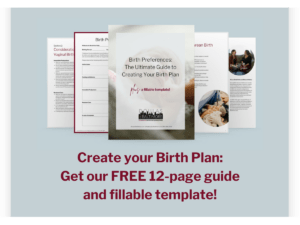The third trimester is between 28 and 42 weeks of pregnancy, and the final weeks before delivery. While your baby is growing and getting ready for their birth day, you might be experiencing more discomforts. With difficulty sleeping, feeling full after a few bites, heartburn, and frequent urination, how do you have a healthy third trimester? Here are some tips for keeping you and your baby healthy as delivery day approaches.
Continue eating a healthy and balanced diet–and getting your vitamins and minerals.
During the third trimester, the Office of Disease Prevention and Health Promotion notes that pregnant people may need to consume 450 more calories than their normal diet. They recommend that this come in the form of vegetables, whole grains, and proteins–not sugars and fats. As your baby gets bigger, they may start to compress your stomach, and you can feel full after eating only a little bit. Consider high-protein snacks in between meals if you are having trouble eating what you normally might at a meal.
You may have been taking a prenatal vitamin, and you can continue that into the third trimester. You want to keep getting proper amounts of folate, iron, and calcium. Check with your care provider about what your diet and calorie consumption should look like during a healthy third trimester.
Stay physically active for a healthy third trimester.
The National Institutes of Health recommend that people try to be as physically active during pregnancy as they were before. With the physical changes that your body is going through as you prepare for labor (link to blog), you may find the exercise harder or more uncomfortable. However, studies show that exercise can help reduce bloating, leg cramps, and backaches, and reduce other conditions like gestational diabetes, preeclampsia, and postpartum depression. Consider moderate exercise, like a walk around the neighborhood, a water aerobics class, or a prenatal yoga class.
Listen to your body and your body’s signals.
By the end of your pregnancy, you may feel bloated, with pains in your belly and back, among other places, and tired from a lack of sleep. You might be uncomfortable, but your body is preparing for birth. While it might be hard to imagine getting comfortable before baby is born, you can try a number of things to relieve the aches. A warm bath or shower can help you relax, and relax your muscles. Pregnancy pillows or other support pillows can make sitting or sleeping more comfortable. Wear loose fitting clothes and don’t be afraid to fan yourself if you are hot!
Learn more about what to expect during a healthy third trimester in our four week Complete Childbirth Education class or our intensive, one-day Birth Basics.




